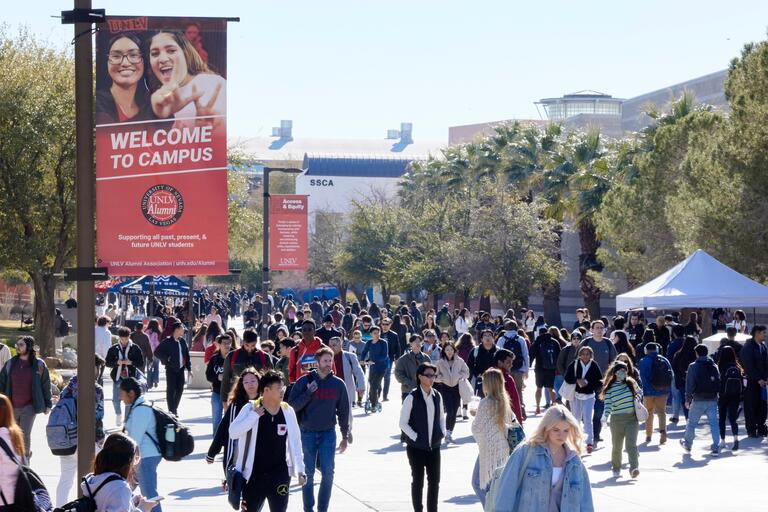Clayton Rhodes's rebellious spirit came long before he got his official student ID.
Rhodes has Down syndrome and in the third grade, school officials recommended his parents, John and Shelly, place him in a special school that would help him learn life skills. His parents knew their son could excel if he was with students of all backgrounds and advocated for him to be in the regular class, where he thrived.
At Faith Lutheran High School, his parents helped set up an inclusive program for students with intellectual disabilities. Rhodes was in a regular classroom with a curriculum tailored to his level. He attended homecoming dances, played on the school's football team, and performed with the choir.
"Being included was a motivation for him to strive to do better," said Shelly Rhodes.

Rhodes is again defying the odds. In January, the 19-year-old enrolled at UNLV and is the first student in FOCUS, a new College of Education program that provides job training and social skills for students with intellectual disabilities.
He enrolled in political science 101, a freshman seminar, and a physical education course. He has term papers he dreads just like any other student, and looks forward to the Rebel games he's been attending since he was a newborn baby. His notebooks are filled with the x's and o's of football plays he hopes UNLV football coach Tony Sanchez may one day consider.
"It's been a lifelong dream for him," said Shelly Rhodes. "He's so excited to be there and be a Rebel and be on the campus. It's so important for us and for him to interact with students his own age that he can learn from and grow with."
F.O.C.U.S. - Forming Occupational and Community Understanding for Success - is the brainchild of Joshua Baker, an assistant professor of educational and clinical studies. Baker wanted UNLV to join the growing number of higher education institutions that offer a program to help students with special needs get job skills and enjoy college like any other student. There are 232 such programs in the U.S., according to Think College, a project of the Institute for Community Inclusion at the University of Massachusetts Boston.
Baker cites a recent study in the Journal of Intellectual Disabilities that suggests individuals with disabilities enrolled in postsecondary programs are more likely to be gainfully employed than those who do not attend these programs.
Rhodes enjoys being in class, said his freshman seminar instructor, Nathan Slife.
"As is typical for most students, Clayton has become more confident and comfortable as the semester progressed. Clayton does participate in class and I have noticed his comments become more relevant and focused on the topics we are discussing," Slife said. "I view Clayton's participation in our discussions as a vital part of our classroom learning environment."
Baker expects two more students to enroll in the program this fall, and he's always looking for volunteers and funding to keep the program going.
The program matches participants with peer mentors, the majority of whom are majoring in education.
During the first few weeks of the semester, Rhodes walked to and from class with Baker and a peer mentor. Now, a few months into the spring semester, he is navigating the campus on his own. His peer mentors helped with homework and invited him to join DASH, a student service program to help feed homeless people and accompany him to UNLV athletic events, including women's volleyball where Rhodes occasionally helps the team.
"It's awesome," Clayton Rhodes said of his experiences at UNLV. His eyes light up when he's asked about why he likes college and praises the gym, sporting events, working with the volleyball team and running into his friends from church and high school.
Shelly Rhodes hopes the volunteers gain something out of the experience too.
"I hope the other students will see how much he is capable of doing and when they become employers, they'll know that somebody like Clayton is employable," she said. "I hope that Clayton will start to foster more of an independence so he can go on to independent living and hold a job."
Parents of students with special needs sometimes dismiss higher education as an option for their children, said Shelly Rhodes. "They don't think their kids can go. They don't think about that. My husband and I haven't been satisfied with status quo with Clayton. We always put high expectations on him. That's one thing I would say to parents: have high expectations for your children and look for other opportunities and build relationships with people."
"We tried to build relationships with people in Clayton's life and opportunities have opened for him."
For more information, program expenses and admission requirements, visit the FOCUS website.



